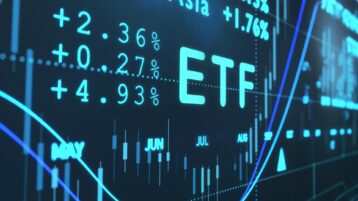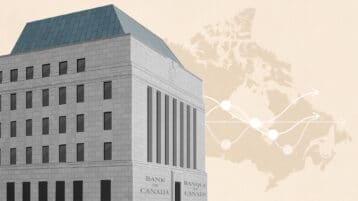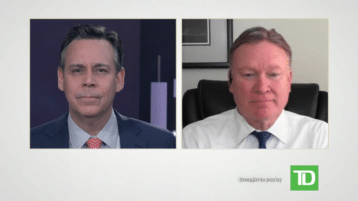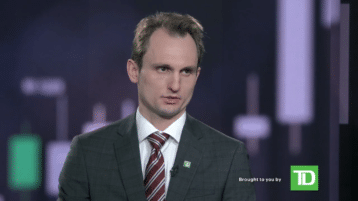Print Transcript
[music] >> Hello, I'm Greg Bonnell. Welcome to MoneyTalk Live, brought to you by TD Direct Investing.
Every day, I'll be joined by guests from across TD, many of whom you'll only see here.
We're going to take you through what's moving the markets and answer your questions about investing.
coming up on today show, we are going to hear from TD Asset Management James Hunter on the health of the banking sector after the collapse of Silicon Valley Bank.
Money talks Anthony Okolie is going to have a look at what all of this could mean for next week's US Federal Reserve rate decision and Haining Zha will join us to discuss the elephantine is a plot a course for more modest growth this year. Plus in today's WebBroker education segment, Nugwa Haruna will walk us through how you can research GICs using the platform.
Before we get all that, let's get you an update on the market.
Right now in Toronto, you are seeing downward pressure from the financials and some energy names. We have 151 point deficit, about three quarters of a percent.
You are seeing gold prices very firm.
Barrick's at 2312 per share, it's up a little bit more than 5%.
We are seeing a pullback in American benchmark crude prices. It is hitting some of the big energy majors including Cenovus, it's down to the tune of almost 4%. South of the border, lots to digest over the weekend for investors in terms of what happened with Silicon Valley Bank.
The moves that were made by the Fed and regulars. Right now, you are in positive territory, but 23 points to the upside, a little bit more than half a percent. The tech heavy NASDAQ, last time I checked, was bearing the better than the broader market,150 point gain up one and 1/3 of a percent. The regional banks today are still feeling the pain. Right now, Charles Schwab appears to be off the lows of the session at 5295, it is down about 10% right now. That is your market of day.
Financial markets are laser focused on the fast-moving developments surrounding Silicon Valley Bank.
Earlier, I was joined by James Hunter, banks and insurance analyst at TD Asset Management, to put the situation and context.
>> What happened is that Friday around lunchtime, regulators closed the Silicon Valley Bank.
that is a pretty meaningful bank out of California. They focus on technology companies, a lot of startups, and will actually be the second largest bank failure in the US ever.
So it's a pretty significant development, obviously. Regulars also closed another bank. We learn that on Sunday. That's in New York, a little smaller.
investors are stunned by these developments.
It's moving equity values around a lot and there's a lot of concerns about it spreadingwider throughout the sector.
>> Let's talk about those concerns because obviously before the past couple of days, I would forgive anyone who doesn't keep a careful eye on this like we do, for even knowing what Silicon Valley Bank was and now it's all over the headlines. Let's put it in context as to what happened to them, what happened to the other bank and what it means to the broader system.
> Okay. If we start with why this happened, it happens specifically at Silicon Valley for a couple of reasons.
The first is on the liability side of the balance sheet in terms the deposits.
Silicon Valley had only 3% of their deposit base in amounts under $250,000 and that a magic number because that's where the FDIC deposit insurance would kick in at that level.
So what it means is that they didn't have a lot of mom and pop retail investors.
They had small business owners, a lot of these founders of tech startups, they'd have cash in the bank and at the first sign of trouble, they started yanking those deposits.
That specifically what happened. Maybe I will reiterate, it's 3% of their deposits were really small and that compares to an industry standard of 40%.
So it's a very meaningful difference. The other thing was on the asset side of the balance sheet.
They had over half of their assets in securities and that's quite a bit more than the industry standard of 20%.
What they did with those securities is they put them in long-duration bonds.
Those long-duration bonds decreased in value as interest rates moved higher and that created this mismatch between on the balance sheet to and that specifically what caused this to happen.
>> So some factors there that are clearly very much related and sort of singular to Silicon Valley Bank. At the same time, over the weekend, you talked about the market concern. We saw it heading into the weekend.
We saw regulators act and the Fed step in.
He did see a new lending program. Explain that to us and what they were trying to achieve.
>> So what regulators want to do is step in to restore confidence that there wasn't going to be a wider spread panic. So what they've agreed to do is make sure that all the deposit holders will get their money back and it doesn't matter if they are above or below the $250,000 threshold.
So that's important. It means that people don't have to rush out to their own bank tomorrow morning if they bank at a regional bank and get concerned. So what they will do now is they will try to sell Silicon Valley to another financial institution, what's left of it, but we don't know if that will work out. The existing equity holders sort of get wiped out.
We don't know how much the bondholders will get back but the deposit holders will be okay. So that helps stem the panic.
The other thing is they have established a sort of a lending program now for all the banks in the banking system and what it will allow them to do is access money directly from the SCC and the treasury and they can exchange for that securities, they can pledge them as collateral and they will take them at par so it doesn't matter if they've got $0.80 on the dollar, $0.60 on the dollar.
The Fed will take that power and that really helps with the liquidity issue.
>> So as depositors hold on, we are seeing a market reaction in terms of the stocks.
Let's talk about the investment thesis around the US banks and perhaps how has shifted in the last couple of days in the wake of all this.
>> Sure. We have had a favourable view of Banks last year and that had some ups and downs over the year, but in general worked out well because the banks benefit from rising interest rates. As we entered this year, we were thinking, well, interest rates are slowing the economy down, there's going to be rising concerns about credit so we were getting a little bit more cautious about the banks.
We had no idea something like this is going to happen. It is a big shock.
And I think it's a problem for the investment case in the short term and that's because people are going to be concerned about the equity values that this banks. They need to look at liquidity, funding. You sort of have the horrors, the memories going back to the financial crisis.
That's not going to happen this time. We are way stronger.
So I think it's hard to get too negative on the banks. They become quite cheap. The share price reaction happened abruptly. So broadly for the sector, is a bit of a concern.
>> I know the policy of the US Federal Reserve aren't necessarilyyour focus but there is a role to be played here in terms of the aggressive rate hikes we've seen over the past year or so, some of the things that are happening in terms of bank assets clearly has some thinking to do.
In about a week, they have another rate announcement.
> Yeah, and what I think would happen is this will be part of the Mosaic that they are looking at in terms of the economic data and how the economy is evolving, but it would be surprising if they did a 50 basis point rate hike in a couple of weeks.
That would be a surprise. I think people at this point would be expecting 25 basis points but it's also possible that they go in a different direction, and I think the bigger picture is that this is sort of one of those steps along the road of the interest rate cycle that should market more closely at the end of the hiking cycle and that would be my interpretation.
As you alluded to, their implications for the broader sector as you look out a year or two, there could be new regulations that come in in the future to help prevent this kind of thing happening in the future.
>>to sum up the ideas of what's happened, you did a great job of breaking it down, basically over the weekend, regulators saw a problem.
The Fed saw a problem.
They really want to head off a problem and they brought in what they hope I guess is a solution so they won't end up with a wider event.
>> That's exactly right.
They have acted decisively and quickly to make sure that this remains an isolated incident and doesn't spread to the broader sector so that is encouraging in the here and the now but you can't tell when in the share price reactions today and I think that reflects a broader realization of where the economy could be a year or two from now and where the fundamentals of the banks could be a year or two from now.
I don't think they are very likely to be better than they are today.
> That was James Hunter, banks and insurance analyst with TD Asset Management.
Let's check in on the market again.
We will start on Bay Street with the TSX Composite Index.
We are about half a percent of the downside, 88 points from breakeven.
It's within the financials and the energy names weighing on the top line today.
We are seeing a big move in the price of gold. Some of those miners are very strong.
South of the border, since the publisher would meet checked in, we were in positive territory and continue to build on it. The S&P 500 up 35 points, almost a full percent. The tech heavy NASDAQ was faring a bit stronger.
He continues to make gains. It's up 163 points, also 1/2%.
China's closely watched National People's Congress has come to a close as the world's second largest economy plots as growth path for of the near future.
Joining us now is some of the big take away is Haining Zha, were fully manager with TD Asset Management. Let's start with the National People's Congress. Would you take away from the event?
>>this is one of the most prominent annual political events in China and it typically attracts a lot of attention from the market.
The reason why is that it's a great window to observe the general direction of economic policy and other government policy in general.
Typically, during the National People's Congress, the government sets up numerical targets which reflect their goal for the rest of the year.
One of the most-watched one is of course the GDP target and this year, it was set at 5%. That seems to be in normal range but is actually very conservative in nature. The reason why is last year we had a very low base, the realized that GDP growth was only 3% and if you look at the different large institution survey or estimate, they all range somewhere between 5 to 6%. To 5% is really on the very low end of the range.
And the reason for that is the government probably wants to focus more on quality rather than quantity.
Other than the GDP growth target, there are other targets. For example, the employment target.
This year, the government aim to create 12 million new jobs and they want to keep the urban unemployment rate at roughly 5.5%.
The numbers and change a lot compared to last year, but it's still important because in the current environment, is China wanted to recover its GDP growth, the biggest driver is going to be from consumption. If you will want to consume, first they need to have their job and income back.
So it is still very, very important.
The third target is, of course, the inflation target, the government wants inflation to stay under 3%. In the current environment, the current CPI year-over-year is only 2.1%, so it's not going to be a constraining factor for the near future. Of course, there are other types of targets. But generally, they remain stable on a year-over-year basis and we don't see it moving the market a lot. We as an investor actually need to focus on something more concrete in our investment decision-making.
>> Coming into this year, we saw those COVID restrictions with quickly in China.
There was a lot of excitement around it and an economic boom out of that reopening. 5% is a pretty conservative number when talking about China's economy.
Was there thinking that monetary or fiscal policy was going to step in in China and try to boost growth which just isn't happening?
>> That was a focus. To break it down, first of all, in terms of fiscal policy, our main takeaways that there won't be any large fiscal stimulus program.
So if you look at the government planned budget deficit, it is only 3% of GDP, which is a slightly more expensive rate compared to last year's 2.8%. But there is two problems with the official headline budget deficit number. The first one is it includes a lot of the adjustment and carryover, so it might not reflect the true economic reality. So if we do the right adjustment, we can see that this year they are budgeting actually for 4.4% deficit. Compared to last year, it was actually 4.7%, so it was actually in terms of fiscal that impulse, actually turning on a negative side a little bit.
And the second thing about the headline budget deficit is that it is a very narrowly defined measure.
For example, it doesn't include the local government fund which, you know, is a main source of funding for local government operations.
So if we do the adjustment and include that, we can see that last year's numbers actually around 7.4 and this year it's going to be 7.5.
Again, only slightly expansionary.
So our main takeaways that there won't be any large fiscal stimulus.
And probably for a reason because the government, particularly the local government, after the COVID lockdown, they are in bad shape and they need time to heal. So at this point, considering the fiscal sustainability is probably not a good idea to do a large fiscal stimulus program.
And in terms of monetary policy, similar to fiscal policy, we don't expect large monetary stimulus either.
So remember, at the end of last year, language from the government is that the stable monetary policy needed to be more forceful, they needed more forceful execution.
But turn into this year, in the NPC statement, the statement changed to the stable monetary policy needs to be more targeted and accurate.
So that is one thing.
The second thing is if you look at the actual effect on the real economy, the average mortgage rates compared to last year, at the end of last year, it's already come down to 150 basis points.
And the average corporate lending rate has already come down about 60 basis points.
So at this point, there is no point doing a large interest rate cut or anything. At least it's not urgent.
But we do see, on a reserve requirement ratio side, the government can do a little bit more because the overall credit growth is still going to be strong.
It will be commensurate with the nominal GDP growth plus the spread.
So cutting the reserve requirement ratio is basically a reduction of the tax on the banking system.
>> You talked about local government funding, the need for local governments to have some time to heal out of the lockdown.
What rules are playing out in the real estate sector?
>> One final detail we noticed in the budget was that the entry of local government revenue, it's only budgeted to increase by 0.4%, which is a very slight increase. And that item tends to have a high correlation with land sales in the real estate sector.
So this is just another way of saying that the government expects the real estate activity, at least on the new construction site, to be pretty weak, roughly flat.
It is still an improvement compared to last year's decrease of 20%, but it's not something to be excited about from an investment point of view.
> I want to ask if there's any context as to what happened to the Silicon Valley Bank, which is sort of a single issue for Silicon Valley Bank but it did get investors in North America concerned about the financial system. Got the Fed concerned enough to step in with some extraordinary measures over the past couple of days.
What's going on with China's banking sector?
>> Our read on the whole situation is that automatically, financial conditions will tighten everywhere else. So from the Fed's point of view, if the tightening of the financial conditions are already there, then it's kind of doing the work for them.
So for the Fed, they probably have additional motivation to wait for things to settle down and then to move forward.
But the thing is, right now, the labour market conditions are still pretty tight, so they probably don't want to easily give up on hiking the rates and basically tame the inflation. As to its impact on the financial institutions elsewhere, particularly on Chinese banks, I think it's actually arguing for better diversification impact in this kind of environment because China is actually in a very different monetary cycle; while the rest of the world is doing the tightening, China is actually doing easing.
Although the easing magnitude is probably less than what people expected, nonetheless, it is still a pretty good diversification.
>> Fascinating stuff and a great start to our program with finding a job. We are going to get your questions for findings on China's economy and the markets in just a moment's time.
And a reminder that you can get in touch with us any time.
just you know moneytalklive@td.com.
Now, let's get to today's educational segment.
GICs are one tool that investors can consider an WebBroker has tools which can help you research the space.
joining us now with more, Nugwa Haruna, Senior client education instructor with TD Direct Investing. Always great to have you on the program.
Let's talk about if someone wanted to buy a GIC, how would they go about it on WebBroker?
>>it's always a pleasure being here, Greg.
We are still talking about GICs and that's because rate changes, potential rate hikes, they are still in everybody's mind.
Last week, the Bank of Canada kept rates the same. The overnight rate stayed at 4.25% and the US federal government is not turning down the idea of increasing rates along the way.
So if investors are looking to take advantage of potential rate hikes or rates now stalling, they can do that using GICs.
Let's go into WebBroker and show investors what they can find different GICs.
Once in WebBroker, an investor would click on research. Under investments, we will go to the GIC Rate Sheet.
So let's talk about the investor the things that there might be a potential for rate hikes and they don't want to lock themselves in for a long period, those might want to consider using cashable GICs. These are GICs that allowed the investor to cash out.
they are also known as renewable GICs after a specific timeframe with no penalty.
Investors who may be wants to get potential higher rates and still be locked-in but for a shorter time period, and they would consider using the short-term GICs. If you considerations as well is that some of these GICs also have a minimum purchasing about, see want to be aware of that. For instance, this one year GIC whose length is between 270 and 364 days, the minimum purchase amount if I click on the rate would be US$100,000. So for some investors, that might be a little over the top, a little more money than they have available.
So investors can also essentially… And minimum purchase amount type search as well.
you can find a GIC that offers a lower minimum amount. Finally, investors have available to them a variety of GICs.
So when I click on the long term GIC, investors are able to find different institutions that offer GICs.
So the advantage known as an investor doesn't have to go branch to branch to find GICs with favourable rates.
They can just do that by logging into WebBroker and taking a look at these different institutions and the GIC rates that they are offering.
> So besides rate shopping, any other benefits of having a variety of GICs available?
>> Yes, we talked about it several times on the show already. We talked about it with James.
You specifically talked about this Silicon Valley Bank that actually went out of business last week. So this has led to a lot of fears. Investors are concerned about, if I invest my money, can I get my funds back?
Let's go into WebBroker and I will show investors the variety of different institutions they have available and why investors were investing in GICs may actually still be covered.
So GICs are known as guaranteed investment certificates.
It guarantees that the investor will get their principal back along with some interest payments.
You will notice in WebBroker that you have a variety.
We have upwards of 15 different institutions here.
If the institutions are signed up with CDIC, which is the Canada Deposit Insurance Corporation, investor deposits are also insured.
Please keep in mind that CDIC covers things like checking, savings accounts, things like GICs and term deposits. They don't cover things like stocks, bonds.
That something investors want to be aware of. And now, there is an amount, a maximum amount of which investors will receive their money, that would be $100,000.
Something investors want to be aware of as well is there are different exceptions.
So I would recommend that investors check out the CDIC coverage information on the website.
But I also want to mention that the reason why investors would use a variety of different institutions here would be that if that maximum of $100,000 is reached at one institution, an investor can take advantage of investing another hundred thousand and indifferent institution.
So for instance, if I have $500,000, instead of putting it all in one GIC and if that institution goes out of business I only got $100,000 back, I might be able to split my $500,000 across five different eligible institutions and then I may be able to get back 100,000 from each of those institutions if they got a business.
These are questions investors can think about during these volatile times.
>> Great stuff as always.
Thanks for telling us about the CDIC for the viewership to take a closer look at.
Thanks for that, as always.
> Thank you for having me.
>> Nugwa Haruna, Senior client education sector at TD Direct Investing.
And make sure to check out the learning centre in WebBroker for more educational videos, live, interactive master classes and upcoming webinars.
now before we get your questions about the Chinese economy and markets for Haining Zha, a reminder of how you get in touch with us.
Do you have a question about investing or what's driving the markets?
Our guests are eager to hear what's on your mind, so send us your questions.
There are two ways you can get in touch with us.
You can send us an email anytime at moneytalklive@td.com or you can use the question box right below the screen here on WebBroker.
Just write in your question and hit send.
We'll see if one of our guests can get you the answer right here at MoneyTalk Live.
we are back with Haining Zha, we are discussing the Chinese economy and the Outlook and taking your questions on silicates the first one here, Haining. The viewer wants to know, is China's reopening going to drive the inflation higher?
>> So right now, we are not seeing that.
There are two channels that can drive inflation.
Number one is if Chinese economy reopens, there will be a lot of investment and that will drive up all kinds of commodity prices and be transmitted globally.the second one is consumption. Oncethe consumer's comeback, that will drive CPI.
Right now, we are not saying that.
Right now on the consumer channel, the CPI is at 2.
1% year-over-year.
There is no inflationary pressure to be seen.
Actually from the latest credit data, we can see that consumer are not inclined to make a long-term borrowing and also they actually pay down a lot of the mortgage.
So they are showing a lot of willingness to save and prepare for future emergency situation.
And in terms of the impact on the real commodity prices, if we look at industrial metal as a whole, at the beginning of the year, it first rose and then it came back down, so overall, we don't see a lot of the impact on that front.
There are some specific commodities, copper had a moderate increase but we thought it is probably related to the long-term secular story of electrification rather than the overall commodity been as a whole. If you look elsewhere, for example with oil prices, it has also been very stable.
For now, inflationary pressure coming from China reopening as well contain, I would say.
>> I find that an interesting question as well because there was a point at the early innings of the inflation story when people were still using terms like transitory, a lot of it was about global supply chain disruptions because countries like China and others during the pandemic were shutting down.
>> Yes.
When the economy reopens, the supply chains resume and that could exert some downward pressure on inflation.
>> We have of you are wondering just how reliable China's economic data is.
We get these bullet points from China but the hell of their economy, how should be read them?
> Right.
And there's always a criticism on the reliability of Chinese data.
I would see a few years ago, when the government set very aggressive growth target and from local official point of view, they have a motivation to exaggerate those data. You can cook updated because their career progression was linked to those GDP data.
But now, the government put more focus on quality instead of quantity, so we are seeing gradually those distortions are going away and I still remember a few years back when the Chinese officials start cracking on these false data, it actually got revised down to the actual or pretty close to the actual number.
So I would say the problem is better than before.
But the tricky thing about Chinese economics is that you have to look into the nuance of those data.
For example, we talk about the job creation of 12 million target this year.
Last year, it was the same 12 million new jobs target, but the government actually exceeded the target.
But as we remember, last year, it was an incredibly difficult year with lots of COVID lockdowns and also the businesses had to fire a lot of people. Those data basically doesn't, it doesn't make sense.
But what people need to pay attention to is that 12 million job creation is the growth number.
For example, if later on, the businesses start firing people, those numbers are not in the… It wasn't netted out.
Another target we talked about is urban unemployment rate of 5.5%. You know, in China, there are a lot of migrant workers so when there are jobs in the city, they moved to the city to find those jobs and increase their income.
But when there is no job, they can return to the rural area and disappear from those urban unemployment rate numbers.
So those measures tend to be more stable and it doesn't reflect the sensitivity of the economy to different shocks.
> Very important. Good to know the mechanics of all that there. Another viewer wants us to talk a little bit more about China's housing market and the Outlook there. You mention the fact that at least what we heard from economic growth targets, we aren't expecting a lot.
>> Right. Actually, in recent weeks, we are seeing that secondary market transactions are increasing compared to before. But right now, it is still too early to say because as I mentioned in the government budget, the local government fund income which is highly correlated to real estate land sales is forecast only increase by 0.4%, so it will be curious to see whether the pressure in secondary market transactions can turn into the new projects in the primary market.
Will there be increasing investment?
Right now, I don't see that happening because for many of these real estate developers, they have a lot of existing projects they need to finish and so the priority will be on that.
And considering that everyone's mentality towards housing is already changed, basically housing is for living and offer speculation, and there are a lot of empty units out there.
So if we launch more new projects at this time and in the future, will he get bought by someone else? Will there be enough demand in the market? As hard to say.
So I would say this year overall, the real estate investment trust probably going to be lacklustre.
But of course, better than last year.
>> Real estate investment lacklustre, they are not building more units, there are many at the units. It is a picture or stable? There had been concerns about the health of China's housing market.
>> the Chinese government contain real estate developers, make them more rational.
But things have changed.
Right now, they have fully exposed their risk and the government actually turning going from constraining to be more supportive. Now, they actually encourage pumping more credits for those real estate developers so that they can finish their projects on time and delivered to people.
>> Interesting set. We are going to get back to your question for Haining Zha on the Chinese economy and markets in just a moment's time.
As always, make sure you do your own research before making any investment decisions.
and a reminder that you can get in touch with us at any time.
Do you have a question about investing or what's driving the markets?
Our guests are eager to hear what's on your mind, so send us your questions.
There are two ways you can get in touch with us.
You can send us an email anytime at moneytalklive@td.com or you can use the question box right below the screen here on WebBroker. Just write in your question and hit send.
We'll see if one of our guests can get you the answer right here at MoneyTalk Live.
fallout from the Silicon Valley Bank crisis continues to rattle markets.
Investors are looking ahead at some of the economic data we are going to see and that looming Fed rate decision next week.
A lot changed in a very short period of time. Our Anthony Okolie has been digging in. TD Securities has some musings on this.
>> Yeah, talking about interest rates, talk about Fed rate hikes has shifted somewhat. Currently, markets are pricing in about a 25 basis point rate hike from the next Fed meeting next week.
When you look at the terminal rate, expectations have come down by about 5% as well versus highs of about 5.7% last week.
TD Securities expects bank lending standards it to you it tighten up. While there has been somechat about the Fed holding rates next week, TD Security says the inflation backdrop will make it difficult for the Fed to stop hiking. TD Securities expects a strong inflation report this week which will confirm that core price inflation continue to gain momentum and so TD Securities expects a 25 basis point hike in the March meeting and expect another 25 basis point hike up until July with rates reaching 5.75% by July.
Furthermore, TD Security sees the Fed continuing with quantitative tightening which will lower reserves and deposits.
Turning to the inflation front, TD Securities is looking for an inflation print of 0.4% month over month. For core CPI, they are looking at an increase of 0.5% in February.
Looking ahead first headline CPI, they are looking for headline inflation to actually slow to 3.7% in the fourth quarter of this year. They also project core inflation to slow to the same rate as well. Now, TD Security says thatgoods deflation will be key for core inflation to cool later this year.
Regarding shelter costs, TD Security says that owner equivalent rent and rent prices, rent price inflation, have stayed sticky at higher levels over the past six months.
But they do see some further easing and housing inflation later in the year.
And while they see a softening in use vehicle prices to resume in the middle of the year, they are forecasting… Fall in prices in the month of February.
With regards to wage gains, they believe that wage gains are slowing from high levels and they are looking for, based on leading indicators, pointing to further normalization in wage gains in the near term.
>> Given the developments in the last couple of days and what's coming next week, I had forgetting that we were getting a US inflation for next morning.
Thanks for reminding me.
> My pleasure.
>> Money talks Anthony Okolie.
Let's look at theMarkets.
S&P 500 is almost a full percent to the downside. Gold is getting quite healthy bid in this environment today and that is feeding into the gold-mining stocks in Toronto. A lot of green on the screen. We will check in on Kinross.
We did Barrick off the top of the show.
it was of little more than 5%. Kinross of little more than 6% at this hour. It Manulife feeling some downward pressure today. Nothing too dramatic but it is taking points off the top line number, and 2527 per share, it is down to the tune of 2.6%. South of the border, with all of those developments and concern and the eyes kept on Silicon Valley Bank, we are actually seeing on the other side of all those developments some green on the screen. Got the S&P 500 up about 15 points right now, little off its highs of the session, a up a little more than 1/3 of a percent. The NASDAQ is hanging onto its gains. 166 points to the upside, about 1 1/2%. Although the regional banks are still feeling the pressure south of the border, first horizon, from a basket of names I could've chosen, they are down almost 22%.
We are back with Haining Zha from TD Asset Management talking about the Chinese economy and markets.
Can we get your guests view on China's tech stocks?
>> Actually, since the last time we chatted, not a lot of the fundamentals have changed on tech stocks.
pressure has turned into a tailwind rather than a headwind, so overall, the government wants to be more supportive now that they realize given all of the ChatGPT and AI and upcoming tech revolution. And also on the delisting side, still there is no pressure.
It's very unlikely that they will get delisted in the near term.
But there are two other notable changes.
One of them is what I noticed is the competitive dynamics among the Chinese tech firms has been increasing. Just give you one example, one of the tech companies which is the parent company of TikTok, they actually already launched an online retail business which could potentially take share from Alibaba's or retail business. Another example is JD, another big Chinese company.
They are looking to spend more on the discount shopping which could take share from PDD, another leader in this area. And also the large Chinese telecom companies, for example, China Mobile and China Unicom, they are looking to extend their cloud offering which, you know, could take away Alibaba's share, market leadership.
That's very understandable because last year, it was a very tough environment and in this environment, everybody wanted to survive and sometimes the best defence is the office.
And the second change that I see is that the following the balloon incident, foreign investors showing that they are probably more reluctant to chase the valuation.
They are probably looking to embed a more permanent equity with premium into pricing, which means that if in the last 10 years the average of valuation is at this level, and then in the next foreseeable future, it probably will be lower than that. Lower by how much? We don't know, but increasingly, we are seeing investors embedding these kinds of factors into their pricing.
That you mention the balloon incident. I'm thinking of tensions between China and the West.
Does that make Chinese tech more of a domestic growth story or am I to West focused?
>> I would say based on the geopolitical tension it's definitely more domestic oriented.
Even before the geo-political tensions, if you look at where those revenues are actually derived, it's mainly from the Chinese domestic economy and maybe from some parts of the emerging market as well.
But yeah, domestic economy is a more important part.
>> Fascinating stuff. We will squeeze one more question in before werun out of time for viewer questions.
One of you are asking us how do China's markets look from a valuation perspective?
>>since January,there has been a correction of 15%. The CSI's 300 has already corrected about 5%. So even at the end of January we were talking about Chinese equity valuation is still below the long-term average. So after the correction, of course, it got even more favourable. But there also comes the factor that we mentioned about the geopolitical equity risk premium and how investors evaluate that. Hopefully, for the foreseeable future, the superpowers can put a few guardrails around the relationship and for investors, that is going to be good news.
>> It's always a pleasure to have you and get your insights.
>> My pleasure.
>> Our things to Haining Zha, portfolio manager with TD Asset Management. Stay tuned. For tomorrow's program, Bart Melek, global head of commodity strategy with TD Securities will be our guest, talking about commodities. Who knows? Maybe we'll talk about this rally we are seeing in the price of gold. A reminder that you get a head start with your questions. Just email moneytalklive@td.com. That's all the time wehave for the show today. Thanks for watching. We will see you tomorrow.
[music]
Every day, I'll be joined by guests from across TD, many of whom you'll only see here.
We're going to take you through what's moving the markets and answer your questions about investing.
coming up on today show, we are going to hear from TD Asset Management James Hunter on the health of the banking sector after the collapse of Silicon Valley Bank.
Money talks Anthony Okolie is going to have a look at what all of this could mean for next week's US Federal Reserve rate decision and Haining Zha will join us to discuss the elephantine is a plot a course for more modest growth this year. Plus in today's WebBroker education segment, Nugwa Haruna will walk us through how you can research GICs using the platform.
Before we get all that, let's get you an update on the market.
Right now in Toronto, you are seeing downward pressure from the financials and some energy names. We have 151 point deficit, about three quarters of a percent.
You are seeing gold prices very firm.
Barrick's at 2312 per share, it's up a little bit more than 5%.
We are seeing a pullback in American benchmark crude prices. It is hitting some of the big energy majors including Cenovus, it's down to the tune of almost 4%. South of the border, lots to digest over the weekend for investors in terms of what happened with Silicon Valley Bank.
The moves that were made by the Fed and regulars. Right now, you are in positive territory, but 23 points to the upside, a little bit more than half a percent. The tech heavy NASDAQ, last time I checked, was bearing the better than the broader market,150 point gain up one and 1/3 of a percent. The regional banks today are still feeling the pain. Right now, Charles Schwab appears to be off the lows of the session at 5295, it is down about 10% right now. That is your market of day.
Financial markets are laser focused on the fast-moving developments surrounding Silicon Valley Bank.
Earlier, I was joined by James Hunter, banks and insurance analyst at TD Asset Management, to put the situation and context.
>> What happened is that Friday around lunchtime, regulators closed the Silicon Valley Bank.
that is a pretty meaningful bank out of California. They focus on technology companies, a lot of startups, and will actually be the second largest bank failure in the US ever.
So it's a pretty significant development, obviously. Regulars also closed another bank. We learn that on Sunday. That's in New York, a little smaller.
investors are stunned by these developments.
It's moving equity values around a lot and there's a lot of concerns about it spreadingwider throughout the sector.
>> Let's talk about those concerns because obviously before the past couple of days, I would forgive anyone who doesn't keep a careful eye on this like we do, for even knowing what Silicon Valley Bank was and now it's all over the headlines. Let's put it in context as to what happened to them, what happened to the other bank and what it means to the broader system.
> Okay. If we start with why this happened, it happens specifically at Silicon Valley for a couple of reasons.
The first is on the liability side of the balance sheet in terms the deposits.
Silicon Valley had only 3% of their deposit base in amounts under $250,000 and that a magic number because that's where the FDIC deposit insurance would kick in at that level.
So what it means is that they didn't have a lot of mom and pop retail investors.
They had small business owners, a lot of these founders of tech startups, they'd have cash in the bank and at the first sign of trouble, they started yanking those deposits.
That specifically what happened. Maybe I will reiterate, it's 3% of their deposits were really small and that compares to an industry standard of 40%.
So it's a very meaningful difference. The other thing was on the asset side of the balance sheet.
They had over half of their assets in securities and that's quite a bit more than the industry standard of 20%.
What they did with those securities is they put them in long-duration bonds.
Those long-duration bonds decreased in value as interest rates moved higher and that created this mismatch between on the balance sheet to and that specifically what caused this to happen.
>> So some factors there that are clearly very much related and sort of singular to Silicon Valley Bank. At the same time, over the weekend, you talked about the market concern. We saw it heading into the weekend.
We saw regulators act and the Fed step in.
He did see a new lending program. Explain that to us and what they were trying to achieve.
>> So what regulators want to do is step in to restore confidence that there wasn't going to be a wider spread panic. So what they've agreed to do is make sure that all the deposit holders will get their money back and it doesn't matter if they are above or below the $250,000 threshold.
So that's important. It means that people don't have to rush out to their own bank tomorrow morning if they bank at a regional bank and get concerned. So what they will do now is they will try to sell Silicon Valley to another financial institution, what's left of it, but we don't know if that will work out. The existing equity holders sort of get wiped out.
We don't know how much the bondholders will get back but the deposit holders will be okay. So that helps stem the panic.
The other thing is they have established a sort of a lending program now for all the banks in the banking system and what it will allow them to do is access money directly from the SCC and the treasury and they can exchange for that securities, they can pledge them as collateral and they will take them at par so it doesn't matter if they've got $0.80 on the dollar, $0.60 on the dollar.
The Fed will take that power and that really helps with the liquidity issue.
>> So as depositors hold on, we are seeing a market reaction in terms of the stocks.
Let's talk about the investment thesis around the US banks and perhaps how has shifted in the last couple of days in the wake of all this.
>> Sure. We have had a favourable view of Banks last year and that had some ups and downs over the year, but in general worked out well because the banks benefit from rising interest rates. As we entered this year, we were thinking, well, interest rates are slowing the economy down, there's going to be rising concerns about credit so we were getting a little bit more cautious about the banks.
We had no idea something like this is going to happen. It is a big shock.
And I think it's a problem for the investment case in the short term and that's because people are going to be concerned about the equity values that this banks. They need to look at liquidity, funding. You sort of have the horrors, the memories going back to the financial crisis.
That's not going to happen this time. We are way stronger.
So I think it's hard to get too negative on the banks. They become quite cheap. The share price reaction happened abruptly. So broadly for the sector, is a bit of a concern.
>> I know the policy of the US Federal Reserve aren't necessarilyyour focus but there is a role to be played here in terms of the aggressive rate hikes we've seen over the past year or so, some of the things that are happening in terms of bank assets clearly has some thinking to do.
In about a week, they have another rate announcement.
> Yeah, and what I think would happen is this will be part of the Mosaic that they are looking at in terms of the economic data and how the economy is evolving, but it would be surprising if they did a 50 basis point rate hike in a couple of weeks.
That would be a surprise. I think people at this point would be expecting 25 basis points but it's also possible that they go in a different direction, and I think the bigger picture is that this is sort of one of those steps along the road of the interest rate cycle that should market more closely at the end of the hiking cycle and that would be my interpretation.
As you alluded to, their implications for the broader sector as you look out a year or two, there could be new regulations that come in in the future to help prevent this kind of thing happening in the future.
>>to sum up the ideas of what's happened, you did a great job of breaking it down, basically over the weekend, regulators saw a problem.
The Fed saw a problem.
They really want to head off a problem and they brought in what they hope I guess is a solution so they won't end up with a wider event.
>> That's exactly right.
They have acted decisively and quickly to make sure that this remains an isolated incident and doesn't spread to the broader sector so that is encouraging in the here and the now but you can't tell when in the share price reactions today and I think that reflects a broader realization of where the economy could be a year or two from now and where the fundamentals of the banks could be a year or two from now.
I don't think they are very likely to be better than they are today.
> That was James Hunter, banks and insurance analyst with TD Asset Management.
Let's check in on the market again.
We will start on Bay Street with the TSX Composite Index.
We are about half a percent of the downside, 88 points from breakeven.
It's within the financials and the energy names weighing on the top line today.
We are seeing a big move in the price of gold. Some of those miners are very strong.
South of the border, since the publisher would meet checked in, we were in positive territory and continue to build on it. The S&P 500 up 35 points, almost a full percent. The tech heavy NASDAQ was faring a bit stronger.
He continues to make gains. It's up 163 points, also 1/2%.
China's closely watched National People's Congress has come to a close as the world's second largest economy plots as growth path for of the near future.
Joining us now is some of the big take away is Haining Zha, were fully manager with TD Asset Management. Let's start with the National People's Congress. Would you take away from the event?
>>this is one of the most prominent annual political events in China and it typically attracts a lot of attention from the market.
The reason why is that it's a great window to observe the general direction of economic policy and other government policy in general.
Typically, during the National People's Congress, the government sets up numerical targets which reflect their goal for the rest of the year.
One of the most-watched one is of course the GDP target and this year, it was set at 5%. That seems to be in normal range but is actually very conservative in nature. The reason why is last year we had a very low base, the realized that GDP growth was only 3% and if you look at the different large institution survey or estimate, they all range somewhere between 5 to 6%. To 5% is really on the very low end of the range.
And the reason for that is the government probably wants to focus more on quality rather than quantity.
Other than the GDP growth target, there are other targets. For example, the employment target.
This year, the government aim to create 12 million new jobs and they want to keep the urban unemployment rate at roughly 5.5%.
The numbers and change a lot compared to last year, but it's still important because in the current environment, is China wanted to recover its GDP growth, the biggest driver is going to be from consumption. If you will want to consume, first they need to have their job and income back.
So it is still very, very important.
The third target is, of course, the inflation target, the government wants inflation to stay under 3%. In the current environment, the current CPI year-over-year is only 2.1%, so it's not going to be a constraining factor for the near future. Of course, there are other types of targets. But generally, they remain stable on a year-over-year basis and we don't see it moving the market a lot. We as an investor actually need to focus on something more concrete in our investment decision-making.
>> Coming into this year, we saw those COVID restrictions with quickly in China.
There was a lot of excitement around it and an economic boom out of that reopening. 5% is a pretty conservative number when talking about China's economy.
Was there thinking that monetary or fiscal policy was going to step in in China and try to boost growth which just isn't happening?
>> That was a focus. To break it down, first of all, in terms of fiscal policy, our main takeaways that there won't be any large fiscal stimulus program.
So if you look at the government planned budget deficit, it is only 3% of GDP, which is a slightly more expensive rate compared to last year's 2.8%. But there is two problems with the official headline budget deficit number. The first one is it includes a lot of the adjustment and carryover, so it might not reflect the true economic reality. So if we do the right adjustment, we can see that this year they are budgeting actually for 4.4% deficit. Compared to last year, it was actually 4.7%, so it was actually in terms of fiscal that impulse, actually turning on a negative side a little bit.
And the second thing about the headline budget deficit is that it is a very narrowly defined measure.
For example, it doesn't include the local government fund which, you know, is a main source of funding for local government operations.
So if we do the adjustment and include that, we can see that last year's numbers actually around 7.4 and this year it's going to be 7.5.
Again, only slightly expansionary.
So our main takeaways that there won't be any large fiscal stimulus.
And probably for a reason because the government, particularly the local government, after the COVID lockdown, they are in bad shape and they need time to heal. So at this point, considering the fiscal sustainability is probably not a good idea to do a large fiscal stimulus program.
And in terms of monetary policy, similar to fiscal policy, we don't expect large monetary stimulus either.
So remember, at the end of last year, language from the government is that the stable monetary policy needed to be more forceful, they needed more forceful execution.
But turn into this year, in the NPC statement, the statement changed to the stable monetary policy needs to be more targeted and accurate.
So that is one thing.
The second thing is if you look at the actual effect on the real economy, the average mortgage rates compared to last year, at the end of last year, it's already come down to 150 basis points.
And the average corporate lending rate has already come down about 60 basis points.
So at this point, there is no point doing a large interest rate cut or anything. At least it's not urgent.
But we do see, on a reserve requirement ratio side, the government can do a little bit more because the overall credit growth is still going to be strong.
It will be commensurate with the nominal GDP growth plus the spread.
So cutting the reserve requirement ratio is basically a reduction of the tax on the banking system.
>> You talked about local government funding, the need for local governments to have some time to heal out of the lockdown.
What rules are playing out in the real estate sector?
>> One final detail we noticed in the budget was that the entry of local government revenue, it's only budgeted to increase by 0.4%, which is a very slight increase. And that item tends to have a high correlation with land sales in the real estate sector.
So this is just another way of saying that the government expects the real estate activity, at least on the new construction site, to be pretty weak, roughly flat.
It is still an improvement compared to last year's decrease of 20%, but it's not something to be excited about from an investment point of view.
> I want to ask if there's any context as to what happened to the Silicon Valley Bank, which is sort of a single issue for Silicon Valley Bank but it did get investors in North America concerned about the financial system. Got the Fed concerned enough to step in with some extraordinary measures over the past couple of days.
What's going on with China's banking sector?
>> Our read on the whole situation is that automatically, financial conditions will tighten everywhere else. So from the Fed's point of view, if the tightening of the financial conditions are already there, then it's kind of doing the work for them.
So for the Fed, they probably have additional motivation to wait for things to settle down and then to move forward.
But the thing is, right now, the labour market conditions are still pretty tight, so they probably don't want to easily give up on hiking the rates and basically tame the inflation. As to its impact on the financial institutions elsewhere, particularly on Chinese banks, I think it's actually arguing for better diversification impact in this kind of environment because China is actually in a very different monetary cycle; while the rest of the world is doing the tightening, China is actually doing easing.
Although the easing magnitude is probably less than what people expected, nonetheless, it is still a pretty good diversification.
>> Fascinating stuff and a great start to our program with finding a job. We are going to get your questions for findings on China's economy and the markets in just a moment's time.
And a reminder that you can get in touch with us any time.
just you know moneytalklive@td.com.
Now, let's get to today's educational segment.
GICs are one tool that investors can consider an WebBroker has tools which can help you research the space.
joining us now with more, Nugwa Haruna, Senior client education instructor with TD Direct Investing. Always great to have you on the program.
Let's talk about if someone wanted to buy a GIC, how would they go about it on WebBroker?
>>it's always a pleasure being here, Greg.
We are still talking about GICs and that's because rate changes, potential rate hikes, they are still in everybody's mind.
Last week, the Bank of Canada kept rates the same. The overnight rate stayed at 4.25% and the US federal government is not turning down the idea of increasing rates along the way.
So if investors are looking to take advantage of potential rate hikes or rates now stalling, they can do that using GICs.
Let's go into WebBroker and show investors what they can find different GICs.
Once in WebBroker, an investor would click on research. Under investments, we will go to the GIC Rate Sheet.
So let's talk about the investor the things that there might be a potential for rate hikes and they don't want to lock themselves in for a long period, those might want to consider using cashable GICs. These are GICs that allowed the investor to cash out.
they are also known as renewable GICs after a specific timeframe with no penalty.
Investors who may be wants to get potential higher rates and still be locked-in but for a shorter time period, and they would consider using the short-term GICs. If you considerations as well is that some of these GICs also have a minimum purchasing about, see want to be aware of that. For instance, this one year GIC whose length is between 270 and 364 days, the minimum purchase amount if I click on the rate would be US$100,000. So for some investors, that might be a little over the top, a little more money than they have available.
So investors can also essentially… And minimum purchase amount type search as well.
you can find a GIC that offers a lower minimum amount. Finally, investors have available to them a variety of GICs.
So when I click on the long term GIC, investors are able to find different institutions that offer GICs.
So the advantage known as an investor doesn't have to go branch to branch to find GICs with favourable rates.
They can just do that by logging into WebBroker and taking a look at these different institutions and the GIC rates that they are offering.
> So besides rate shopping, any other benefits of having a variety of GICs available?
>> Yes, we talked about it several times on the show already. We talked about it with James.
You specifically talked about this Silicon Valley Bank that actually went out of business last week. So this has led to a lot of fears. Investors are concerned about, if I invest my money, can I get my funds back?
Let's go into WebBroker and I will show investors the variety of different institutions they have available and why investors were investing in GICs may actually still be covered.
So GICs are known as guaranteed investment certificates.
It guarantees that the investor will get their principal back along with some interest payments.
You will notice in WebBroker that you have a variety.
We have upwards of 15 different institutions here.
If the institutions are signed up with CDIC, which is the Canada Deposit Insurance Corporation, investor deposits are also insured.
Please keep in mind that CDIC covers things like checking, savings accounts, things like GICs and term deposits. They don't cover things like stocks, bonds.
That something investors want to be aware of. And now, there is an amount, a maximum amount of which investors will receive their money, that would be $100,000.
Something investors want to be aware of as well is there are different exceptions.
So I would recommend that investors check out the CDIC coverage information on the website.
But I also want to mention that the reason why investors would use a variety of different institutions here would be that if that maximum of $100,000 is reached at one institution, an investor can take advantage of investing another hundred thousand and indifferent institution.
So for instance, if I have $500,000, instead of putting it all in one GIC and if that institution goes out of business I only got $100,000 back, I might be able to split my $500,000 across five different eligible institutions and then I may be able to get back 100,000 from each of those institutions if they got a business.
These are questions investors can think about during these volatile times.
>> Great stuff as always.
Thanks for telling us about the CDIC for the viewership to take a closer look at.
Thanks for that, as always.
> Thank you for having me.
>> Nugwa Haruna, Senior client education sector at TD Direct Investing.
And make sure to check out the learning centre in WebBroker for more educational videos, live, interactive master classes and upcoming webinars.
now before we get your questions about the Chinese economy and markets for Haining Zha, a reminder of how you get in touch with us.
Do you have a question about investing or what's driving the markets?
Our guests are eager to hear what's on your mind, so send us your questions.
There are two ways you can get in touch with us.
You can send us an email anytime at moneytalklive@td.com or you can use the question box right below the screen here on WebBroker.
Just write in your question and hit send.
We'll see if one of our guests can get you the answer right here at MoneyTalk Live.
we are back with Haining Zha, we are discussing the Chinese economy and the Outlook and taking your questions on silicates the first one here, Haining. The viewer wants to know, is China's reopening going to drive the inflation higher?
>> So right now, we are not seeing that.
There are two channels that can drive inflation.
Number one is if Chinese economy reopens, there will be a lot of investment and that will drive up all kinds of commodity prices and be transmitted globally.the second one is consumption. Oncethe consumer's comeback, that will drive CPI.
Right now, we are not saying that.
Right now on the consumer channel, the CPI is at 2.
1% year-over-year.
There is no inflationary pressure to be seen.
Actually from the latest credit data, we can see that consumer are not inclined to make a long-term borrowing and also they actually pay down a lot of the mortgage.
So they are showing a lot of willingness to save and prepare for future emergency situation.
And in terms of the impact on the real commodity prices, if we look at industrial metal as a whole, at the beginning of the year, it first rose and then it came back down, so overall, we don't see a lot of the impact on that front.
There are some specific commodities, copper had a moderate increase but we thought it is probably related to the long-term secular story of electrification rather than the overall commodity been as a whole. If you look elsewhere, for example with oil prices, it has also been very stable.
For now, inflationary pressure coming from China reopening as well contain, I would say.
>> I find that an interesting question as well because there was a point at the early innings of the inflation story when people were still using terms like transitory, a lot of it was about global supply chain disruptions because countries like China and others during the pandemic were shutting down.
>> Yes.
When the economy reopens, the supply chains resume and that could exert some downward pressure on inflation.
>> We have of you are wondering just how reliable China's economic data is.
We get these bullet points from China but the hell of their economy, how should be read them?
> Right.
And there's always a criticism on the reliability of Chinese data.
I would see a few years ago, when the government set very aggressive growth target and from local official point of view, they have a motivation to exaggerate those data. You can cook updated because their career progression was linked to those GDP data.
But now, the government put more focus on quality instead of quantity, so we are seeing gradually those distortions are going away and I still remember a few years back when the Chinese officials start cracking on these false data, it actually got revised down to the actual or pretty close to the actual number.
So I would say the problem is better than before.
But the tricky thing about Chinese economics is that you have to look into the nuance of those data.
For example, we talk about the job creation of 12 million target this year.
Last year, it was the same 12 million new jobs target, but the government actually exceeded the target.
But as we remember, last year, it was an incredibly difficult year with lots of COVID lockdowns and also the businesses had to fire a lot of people. Those data basically doesn't, it doesn't make sense.
But what people need to pay attention to is that 12 million job creation is the growth number.
For example, if later on, the businesses start firing people, those numbers are not in the… It wasn't netted out.
Another target we talked about is urban unemployment rate of 5.5%. You know, in China, there are a lot of migrant workers so when there are jobs in the city, they moved to the city to find those jobs and increase their income.
But when there is no job, they can return to the rural area and disappear from those urban unemployment rate numbers.
So those measures tend to be more stable and it doesn't reflect the sensitivity of the economy to different shocks.
> Very important. Good to know the mechanics of all that there. Another viewer wants us to talk a little bit more about China's housing market and the Outlook there. You mention the fact that at least what we heard from economic growth targets, we aren't expecting a lot.
>> Right. Actually, in recent weeks, we are seeing that secondary market transactions are increasing compared to before. But right now, it is still too early to say because as I mentioned in the government budget, the local government fund income which is highly correlated to real estate land sales is forecast only increase by 0.4%, so it will be curious to see whether the pressure in secondary market transactions can turn into the new projects in the primary market.
Will there be increasing investment?
Right now, I don't see that happening because for many of these real estate developers, they have a lot of existing projects they need to finish and so the priority will be on that.
And considering that everyone's mentality towards housing is already changed, basically housing is for living and offer speculation, and there are a lot of empty units out there.
So if we launch more new projects at this time and in the future, will he get bought by someone else? Will there be enough demand in the market? As hard to say.
So I would say this year overall, the real estate investment trust probably going to be lacklustre.
But of course, better than last year.
>> Real estate investment lacklustre, they are not building more units, there are many at the units. It is a picture or stable? There had been concerns about the health of China's housing market.
>> the Chinese government contain real estate developers, make them more rational.
But things have changed.
Right now, they have fully exposed their risk and the government actually turning going from constraining to be more supportive. Now, they actually encourage pumping more credits for those real estate developers so that they can finish their projects on time and delivered to people.
>> Interesting set. We are going to get back to your question for Haining Zha on the Chinese economy and markets in just a moment's time.
As always, make sure you do your own research before making any investment decisions.
and a reminder that you can get in touch with us at any time.
Do you have a question about investing or what's driving the markets?
Our guests are eager to hear what's on your mind, so send us your questions.
There are two ways you can get in touch with us.
You can send us an email anytime at moneytalklive@td.com or you can use the question box right below the screen here on WebBroker. Just write in your question and hit send.
We'll see if one of our guests can get you the answer right here at MoneyTalk Live.
fallout from the Silicon Valley Bank crisis continues to rattle markets.
Investors are looking ahead at some of the economic data we are going to see and that looming Fed rate decision next week.
A lot changed in a very short period of time. Our Anthony Okolie has been digging in. TD Securities has some musings on this.
>> Yeah, talking about interest rates, talk about Fed rate hikes has shifted somewhat. Currently, markets are pricing in about a 25 basis point rate hike from the next Fed meeting next week.
When you look at the terminal rate, expectations have come down by about 5% as well versus highs of about 5.7% last week.
TD Securities expects bank lending standards it to you it tighten up. While there has been somechat about the Fed holding rates next week, TD Security says the inflation backdrop will make it difficult for the Fed to stop hiking. TD Securities expects a strong inflation report this week which will confirm that core price inflation continue to gain momentum and so TD Securities expects a 25 basis point hike in the March meeting and expect another 25 basis point hike up until July with rates reaching 5.75% by July.
Furthermore, TD Security sees the Fed continuing with quantitative tightening which will lower reserves and deposits.
Turning to the inflation front, TD Securities is looking for an inflation print of 0.4% month over month. For core CPI, they are looking at an increase of 0.5% in February.
Looking ahead first headline CPI, they are looking for headline inflation to actually slow to 3.7% in the fourth quarter of this year. They also project core inflation to slow to the same rate as well. Now, TD Security says thatgoods deflation will be key for core inflation to cool later this year.
Regarding shelter costs, TD Security says that owner equivalent rent and rent prices, rent price inflation, have stayed sticky at higher levels over the past six months.
But they do see some further easing and housing inflation later in the year.
And while they see a softening in use vehicle prices to resume in the middle of the year, they are forecasting… Fall in prices in the month of February.
With regards to wage gains, they believe that wage gains are slowing from high levels and they are looking for, based on leading indicators, pointing to further normalization in wage gains in the near term.
>> Given the developments in the last couple of days and what's coming next week, I had forgetting that we were getting a US inflation for next morning.
Thanks for reminding me.
> My pleasure.
>> Money talks Anthony Okolie.
Let's look at theMarkets.
S&P 500 is almost a full percent to the downside. Gold is getting quite healthy bid in this environment today and that is feeding into the gold-mining stocks in Toronto. A lot of green on the screen. We will check in on Kinross.
We did Barrick off the top of the show.
it was of little more than 5%. Kinross of little more than 6% at this hour. It Manulife feeling some downward pressure today. Nothing too dramatic but it is taking points off the top line number, and 2527 per share, it is down to the tune of 2.6%. South of the border, with all of those developments and concern and the eyes kept on Silicon Valley Bank, we are actually seeing on the other side of all those developments some green on the screen. Got the S&P 500 up about 15 points right now, little off its highs of the session, a up a little more than 1/3 of a percent. The NASDAQ is hanging onto its gains. 166 points to the upside, about 1 1/2%. Although the regional banks are still feeling the pressure south of the border, first horizon, from a basket of names I could've chosen, they are down almost 22%.
We are back with Haining Zha from TD Asset Management talking about the Chinese economy and markets.
Can we get your guests view on China's tech stocks?
>> Actually, since the last time we chatted, not a lot of the fundamentals have changed on tech stocks.
pressure has turned into a tailwind rather than a headwind, so overall, the government wants to be more supportive now that they realize given all of the ChatGPT and AI and upcoming tech revolution. And also on the delisting side, still there is no pressure.
It's very unlikely that they will get delisted in the near term.
But there are two other notable changes.
One of them is what I noticed is the competitive dynamics among the Chinese tech firms has been increasing. Just give you one example, one of the tech companies which is the parent company of TikTok, they actually already launched an online retail business which could potentially take share from Alibaba's or retail business. Another example is JD, another big Chinese company.
They are looking to spend more on the discount shopping which could take share from PDD, another leader in this area. And also the large Chinese telecom companies, for example, China Mobile and China Unicom, they are looking to extend their cloud offering which, you know, could take away Alibaba's share, market leadership.
That's very understandable because last year, it was a very tough environment and in this environment, everybody wanted to survive and sometimes the best defence is the office.
And the second change that I see is that the following the balloon incident, foreign investors showing that they are probably more reluctant to chase the valuation.
They are probably looking to embed a more permanent equity with premium into pricing, which means that if in the last 10 years the average of valuation is at this level, and then in the next foreseeable future, it probably will be lower than that. Lower by how much? We don't know, but increasingly, we are seeing investors embedding these kinds of factors into their pricing.
That you mention the balloon incident. I'm thinking of tensions between China and the West.
Does that make Chinese tech more of a domestic growth story or am I to West focused?
>> I would say based on the geopolitical tension it's definitely more domestic oriented.
Even before the geo-political tensions, if you look at where those revenues are actually derived, it's mainly from the Chinese domestic economy and maybe from some parts of the emerging market as well.
But yeah, domestic economy is a more important part.
>> Fascinating stuff. We will squeeze one more question in before werun out of time for viewer questions.
One of you are asking us how do China's markets look from a valuation perspective?
>>since January,there has been a correction of 15%. The CSI's 300 has already corrected about 5%. So even at the end of January we were talking about Chinese equity valuation is still below the long-term average. So after the correction, of course, it got even more favourable. But there also comes the factor that we mentioned about the geopolitical equity risk premium and how investors evaluate that. Hopefully, for the foreseeable future, the superpowers can put a few guardrails around the relationship and for investors, that is going to be good news.
>> It's always a pleasure to have you and get your insights.
>> My pleasure.
>> Our things to Haining Zha, portfolio manager with TD Asset Management. Stay tuned. For tomorrow's program, Bart Melek, global head of commodity strategy with TD Securities will be our guest, talking about commodities. Who knows? Maybe we'll talk about this rally we are seeing in the price of gold. A reminder that you get a head start with your questions. Just email moneytalklive@td.com. That's all the time wehave for the show today. Thanks for watching. We will see you tomorrow.
[music]

























